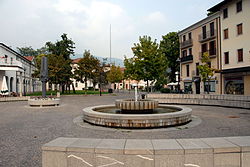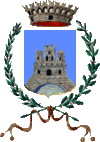Tarcento
| Tarcento | ||
|---|---|---|
| Comune | ||
| Città di Tarcento | ||
 |
||
|
||
| Location of Tarcento in Italy | ||
| Coordinates: 46°13′N 13°13′E / 46.217°N 13.217°E | ||
| Country | Italy | |
| Region | Friuli-Venezia Giulia | |
| Province / Metropolitan city | Udine (UD) | |
| Frazioni | Bulfons, Ciseriis, Coia, Collalto, Collerumiz, Loneriacco, Molinis, Sammardenchia, Sedilis, Segnacco, Stella, Zomeais | |
| Government | ||
| • Mayor | Celio Cossa | |
| Area | ||
| • Total | 35 km2 (14 sq mi) | |
| Elevation | 230 m (750 ft) | |
| Population (March 2009) | ||
| • Total | 9,112 | |
| • Density | 260/km2 (670/sq mi) | |
| Demonym(s) | Tarcentini | |
| Time zone | CET (UTC+1) | |
| • Summer (DST) | CEST (UTC+2) | |
| Postal code | 33017 | |
| Dialing code | 0432 | |
| Patron saint | St. Peter | |
| Website | Official website | |
Tarcento (Friulian: Tarcint) is a town and comune (municipality) in the province of Udine, in the Friuli-Venezia Giulia region of north-eastern Italy.
Tarcento occupies a strategic location at a bridging point on the River Torre. Archaeological finds indicate a very early date for its first human occupation. Tarcento first appears in the historical record around the year 1126 CE, when an Austrian nobleman, Machland, from Perg, was feudal overlord of the castle around which the town had developed. Subsequently a second castle was built on the hill of Coia.
In 1219 the Caporiaccio family took over as feudal overlords. Both castles were badly damaged during wars for control of the area between the Holy Roman Empire and the Republic of Venice in the Middle Ages, and in 1420 CE Tarcento became part of the territory controlled by the Venetian Republic.
The main castle was burnt down in a peasant's uprising and then damaged by a serious earthquake, both in 1511 CE. Nothing remains of that castle today. A corner of the tower of the castle on the hill of Coia can still be seen.
Following the Napeleonic conquest of the Venetian Republic in 1797, Tarcento came under Austrian Rule. In 1866 Tarcento became part of the Kingdom of Italy.
During World War I, Tarcento was close to the front line on the eastern front. After the Italian rout at the Battle of Caporetto in 1917, Tarcento was occupied by the Austrians until the end of the war.
A catastrophic earthquake in 1976 caused a great deal of damage in the town and its surroundings, all of which has subsequently been repaired.
Tarcento is twinned with:
...
Wikipedia


